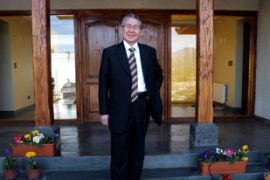Fujimori to be extradited to Peru
Chilean court rules former Peru leader should face human rights abuse charges.

The court ruled that Fujimori is to be extradited on two counts of gross human rights violations and five counts of corruption, Al Jazeera’s Lucia Newman said in Santiago.
| Profile |
The ruling by Chile’s supreme court cannot be appealed against and the Chilean government of Michelle Bachelet has previously said it would return Fujimori to Peru as soon as possible in the event that the court decides he should be extradited.
Lengthy process
Gabriel Zaliasnik, Fujimori’s lawyer, said his client will “respect the decision of Chilean justice”.
Chile has three months to complete the extradition and any trial is likely to be a lengthy process.
Chile’s high court judges have been reviewing the case after a single judge ruled in July in Fujimori’s favour against the extradition.
Announcement delayed
The court reached their decision on September 10, but the announcement was put off last week amid accusations that the government was stalling it for political reasons.
| “After years of evading justice, Fujimori will finally have to respond to the charges and evidence against him in the country he used to run like a mafia boss” Jose Miguel Vivanco, Human Rights Watch |
As Chile prepared to transfer Fujimori, Peru welcomed the ruling, pledging a fair legal process and dignified treatment for the former president during his detention.
“The next step is to bring him to Lima and to offer guarantees of a fair trial,” Jose Garcia Belaunde, Peruvian foreign minister, told CPN radio.
He said the Chilean Supreme Court had carried out its work with “responsibility, seriousness and independence.”
New York-based Human Rights Watch called the decision an unprecedented step forward for international justice.
“This is the first time that a court has ordered the extradition of a former head of state to be tried for gross human rights violations in his home country,” the organisation said in a statement.
“After years of evading justice, Fujimori will finally have to respond to the charges and evidence against him in the country he used to run like a mafia boss,” Jose Miguel Vivanco, HRW’s Americas director, said.
Tense relations
Lucia Newman said Fujimori’s presence was a “hot potato” for the Chilean government and was exacerbating already tense relations with its neighbour.
“There were many in Peru who thought Fujimori was being kept in Chile just to spite its neighbour. So the Chilean government is very happy he will be moving on,” she said.
Fujimori was born to Japanese parents and, after fleeing Peru in 2000, he spent five years in Japan where he later resigned as president via a fax message.
A former academic, he became president in 1990, defeating Mario Vargas Llosa, the renowned writer.
Japan confirmed Fujimori’s citizenship and consistently refused extradition requests from Lima before he flew unannounced to Chile in 2005 to launch another bid for Peru’s presidency.
While under house arrest in Santiago, Fujimori even made an unsuccessful attempt to be elected to Japan’s parliament, a candidacy that critics in Peru saw as another bid to avoid prosecution.
